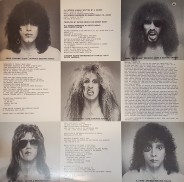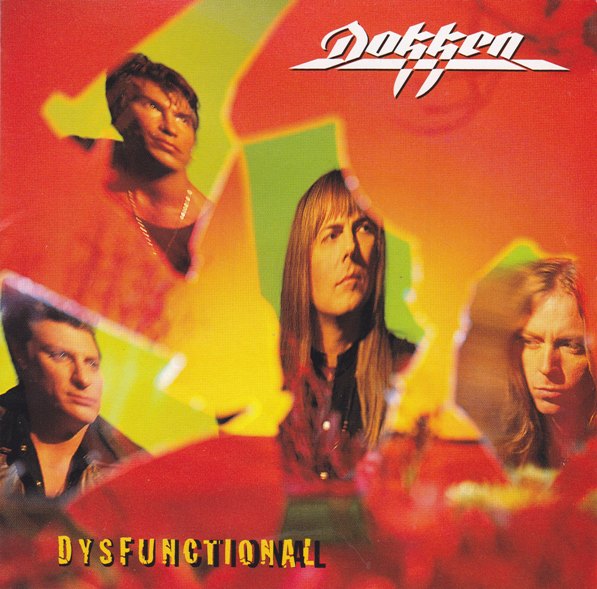“Twisted Sister…come out and play!” Happy anniversary to Come Out and Play released on this day 34 years ago.
 TWISTED SISTER – Come Out and Play (1985 Atlantic LP & Spitfire CD remaster)
TWISTED SISTER – Come Out and Play (1985 Atlantic LP & Spitfire CD remaster)
What was a band at the proverbial crossroads to do? Continue along the commercial path of the 3 million copy selling Stay Hungry? Or revert to the tried and true heavy-as-an-SMF sound of yore?
There was only one dissenting vote. Bassist Mark “The Animal” Mendoza felt that putting “Leader of the Pack” on the new album was a mistake. The other four voted “yes” but some grew to regret it. Both Dee Snider and J.J. French have since realized the error of their ways. Today, Come Out and Play is acknowledged as the beginning of the end, though it has its fans and some sturdy tracks to support it.
Twisted Sister recruited Scorpions producer Dieter Dierks and enlisted high profile guest stars like Alice Cooper, Billy Joel, Brian Setzer and Clarence Clemons. They were top-loaded onto a old-time rock and roller called “Be Chrool to Your Scuel”, and the gamble backfired immediately when MTV banned the music video for its zombies and ghouls. It’s an interesting track at least. You don’t hear a sax solo on a Twisted Sister song every day, nor the kind of plucking that Brian Setzer deals in.
“Leader of the Pack” was a failure as well, actually a re-recording of a track that debuted on the Ruff Cuts EP. The video (starring the then-hot Bobcat Goldthwaite) further painted Twisted Sister as a novelty band.
Tensions, especially between Mendoza and Snider, were amplified. The songs that sound like they were meant to be “hits” fall far short. The impression you get from “You Want What We Got” is that it was intended to be a specific kind of hit. Unfortunately it’s just a repetitive anthem. “Lookin’ Out for #1” is similarly filler, a song that never quite clicks.
Some tracks maintained a heavy rock presence. They include the anthem “I Believe In Rock and Roll”. It’s a manifesto for the PMRC generation; a decent attempt that just misses the mark. “Come Out and Play” features A.J. Pero nailing down a speedy beat, but the production of Dierks neutered the powerful drummer. Dierks introduced keyboards to some of the tracks, watering them down needlessly. “The Fire Still Burns” works better than some of the other songs, and despite the production you can hear A.J. is just crushing the kit. If the backing vocals sound unusually lush, that’s Don Dokken and Gary Holland. “Out on the Streets” trades the speed in for plaintive melodies, and is the better for it. Finally “Kill or Be Killed” does what it promises. Unbelievable that A.J. could play at such a relentless velocity, but he was an absolute beast.
Strangely, some of the best tracks are the ballads. Dark ballads. Ballads of depression, of loneliness, of alienation. “I Believe in You” is the first of two, bolstered by strong melodies and Dee Snider’s enviable pipes. The one that impresses the most is the CD and cassette bonus track “King of the Fools”. Although “Kill or Be Killed” ends the album just fine, this coda adds some substance. Sounding like a man destroyed, Dee sings the melancholy lyrics.
What kind of kingdom has no throne?
No crown or castle do I own,
I don’t have silver gold or jewels,
Yet I’m the king, king of the fools.
It’s surprisingly thoughtful songwriting, complimenting the mournful melodies. Yet there is a defiant, powerful streak in the choruses.
King of the fools,
Who are these people to cast stones?
King of the fools,
Better a fool than just a clone.
Dee Snider has always resonated with the underdogs, the bullied, the downtrodden. “King of the Fools” might be the most honest of all those songs. Some regal guitar melodies by J.J. French and Eddie “Fingers” Ojeda show that they were picking up what Dee was laying down.
Here’s the catch though. If you’re buying this album, you need “King of the Fools”. To get it, you’ll want the CD. But Come Out and Play might be most notable for the album cover you can only get on vinyl. Open up that manhole cover and out pops Dee Snider in all his…all his…rags.
Heeere’s Dee!
Do what I did. Get CD and LP, just for the cover. Everybody needs a pop-up Dee Snider.
2.5/5 stars


























 DON DOKKEN – Up From the Ashes (1990 Geffen)
DON DOKKEN – Up From the Ashes (1990 Geffen)



 GEORGE LYNCH – Sacred Groove (1993 Elektra)
GEORGE LYNCH – Sacred Groove (1993 Elektra)













